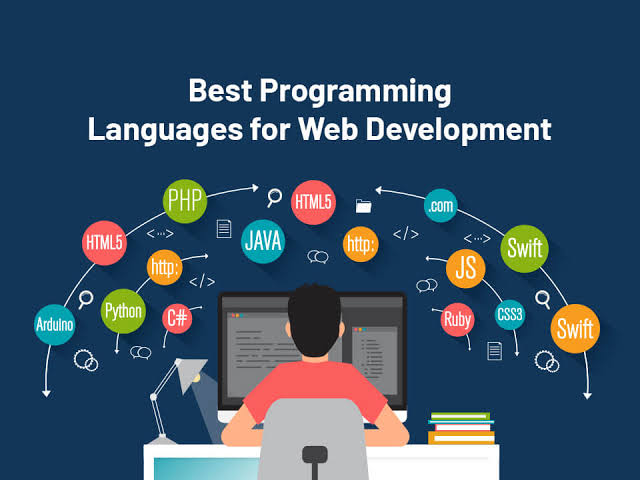See the top programming languages we have around for web developers
Web development is dynamic and ever-evolving field. It demands developers stay updated with latest technologies. Selecting right programming language is crucial for success of any web development project. Different languages offer distinct advantages. It depends on project's requirements such as speed, scalability. And ease of maintenance. Here are top 10 programming languages essential for web development. Each brings unique features to the table.
1. JavaScript
JavaScript is backbone of modern web development. It enables interactive and dynamic content on websites. Versatile language runs on client-side (in the browser). It also runs on server-side (with Node.js). JavaScript frameworks like React Angular and Vue.js revolutionized front-end development. These tools provide robust tools for building user interfaces. With vast ecosystem and continuous advancements. JavaScript remains indispensable for web developers.
2. Python
Python has gained immense popularity in web development due to its simplicity and readability. Its framework Django is known for its "batteries-included" philosophy. It provides everything needed to build robust web applications. Flask another Python framework, offers more lightweight and flexible approach. Python's versatility extends beyond web development. It moves into areas like data science machine learning and automation. This makes it valuable language for developers to learn.
3. Ruby
Ruby and its web framework Ruby on Rails emphasizes convention over configuration. It enables developers to write clean maintainable code quickly. Rails comes with vast array of built-in features. This reduces need for repetitive code speeding up development. Ruby's elegant syntax and developer-friendly environment have made it favorite for startups. Small businesses looking to launch web applications rapidly often choose it.
4. PHP
PHP is a server-side scripting language that powers a significant portion of the web, including popular platforms like WordPress, Drupal, and Joomla. It is particularly well-suited for web development due to its ease of integration with HTML, databases, and various APIs. Frameworks like Laravel and Symfony provide structured and efficient ways to build large-scale web applications. PHP's extensive documentation and active community support make it a reliable choice for both beginners and experienced developers.
5. Java
Java is a powerful, object-oriented language widely used for building large-scale enterprise web applications. Its platform independence, thanks to the Java Virtual Machine (JVM), ensures compatibility across different systems. Frameworks like Spring and Hibernate offer comprehensive solutions for developing secure and scalable web applications. Java's strong performance, reliability, and vast ecosystem of libraries and tools make it a top choice for complex web development projects.
6. C#
C#, developed by Microsoft, is a versatile language used primarily in conjunction with the .NET framework for building web applications. ASP.NET Core, the latest iteration, is a cross-platform framework that allows developers to build high-performance web applications on Windows, macOS, and Linux. C#'s strong typing and rich feature set, combined with Visual Studio's powerful development environment, provide a robust platform for creating modern web applications.
7. TypeScript
TypeScript, a superset of JavaScript, adds static typing to the language, enhancing code quality and maintainability. Developed by Microsoft, TypeScript has gained widespread adoption in large-scale web applications, thanks to its ability to catch errors during development. Angular, one of the leading front-end frameworks, is built with TypeScript, highlighting its importance in modern web development. TypeScript's compatibility with JavaScript libraries and tools makes it an excellent choice for developers looking to build scalable and maintainable applications.
8. Swift
Swift, developed by Apple, is primarily known for iOS and macOS development but is also gaining traction in web development through frameworks like Vapor. Swift's modern syntax, safety features, and performance make it an attractive option for building server-side web applications. As the demand for seamless integration between mobile and web applications grows, Swift's role in web development is expected to expand.
9. Go
Go, also known as Golang, is a statically typed language developed by Google. It is designed for simplicity, efficiency, and high performance, making it ideal for building scalable web applications and APIs. Go's concurrency model and fast compilation times provide a significant advantage in developing high-performance web services. Frameworks like Gin and Echo offer lightweight and efficient solutions for building web applications in Go. Its straightforward syntax and robust performance make Go a compelling choice for developers focusing on efficiency and speed.
10. Kotlin
Kotlin, developed by JetBrains, is a modern language that runs on the JVM and is fully interoperable with Java. Known for its concise syntax and safety features, Kotlin is becoming increasingly popular for web development, particularly with the Ktor framework. Ktor allows developers to build asynchronous web applications quickly and efficiently. Kotlin's compatibility with existing Java libraries and its growing ecosystem make it a valuable addition to the web development landscape.
Conclusion
Choosing the right programming language for web development depends on various factors, including the project requirements, the team's expertise, and the desired performance characteristics. The languages listed above each offer unique strengths and are supported by active communities and extensive libraries. Whether you're building a simple website or a complex web application, understanding the capabilities and features of these top programming languages will help you make an informed decision and set your project up for success. Embracing these languages and their associated frameworks can significantly enhance your productivity and the quality of your web development projects.
